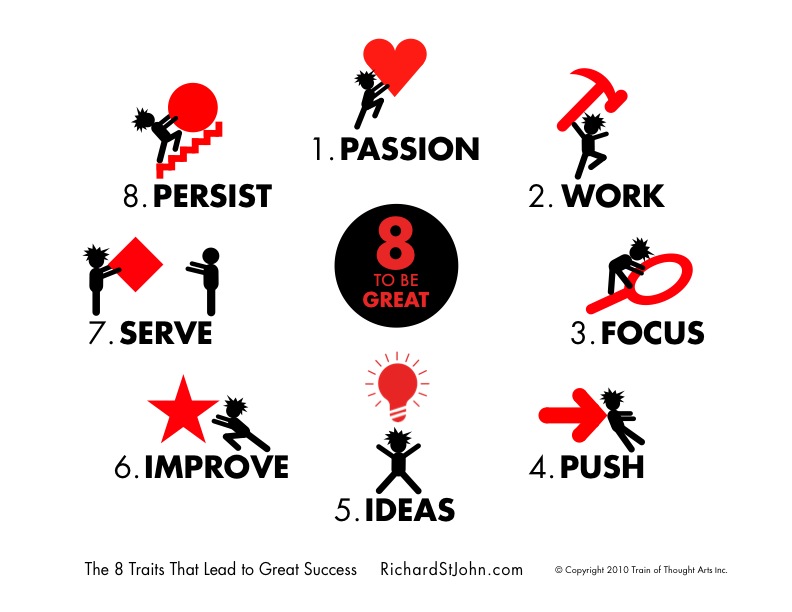Education as a human transformation and personality development

Hi, Habr!
This post, I begin a series of articles on education. I have long picked up a portal for publication, but Habra could not find anything better: many media are already so bogged down in politics and trolling that their editors are forced to turn off the commenting function. Since I believe that in writing culture the main thing is not the content itself, but its discussion, I came to Habr.
')
A warning
I must say at once that many of the points that we will touch on are rather esoteric, and it’s not always possible to confirm them with research and statistics. Judge for yourself - is it possible to accurately measure the level of education or success of a person? If you are already in a hurry to answer “yes” - please wait for an article in which we will discuss the vagueness of typical state education bars.
And in general, the breadth of the outlook and the availability of humanitarian knowledge will only benefit the engineer: not only is the profession of an engineer in itself creative, so he must also understand not only "how to do", but also "why to do" . And this “why”, if you get to the bottom of the essence, boils down to one thing: “so that the soul rejoices.” And here without the esoteric already in any way.
In any case, I will try to look for scientific substantiations of my arguments and will be glad to your comments with links to suitable research.
What is "education"?
In the first article we start from the very beginning. As usual, we go to Wikipedia for the definitions.
The first definition binds education too clearly to the state and its qualifications. But where does the state? Which of the two and a half hundred states should be equal? Quite recently, women and blacks had limited access to education, and, at the state level, quite decent-looking countries. How to take this into account? In general, there are more questions than answers.
The second definition also smacks of manipulation: “the acquisition and improvement of knowledge and skills, even if contrary to the truth, but established as a mandatory norm by written and unwritten laws and norms of society”. It looks like education is the education of obedient robots.
Finally, the lumen is seen in the definitions of "the appropriation of human values" and "the formation of the mind, character and physical abilities." These formulations, at least, are free from administrative and social conventions.
And what do ancient books say on the topic of education, for example, the Bible, the Vedas or the Buddhist scriptures?

Education is the knowledge of oneself, the knowledge of God and the striving towards it, i.e. development of body, mind and spirit. The Bible says: “And I will give them my heart. To know Me, that I am the Lord. " In Bhagavad-Gita: “Stop depending on all manifestations of duality, get rid of the desire to acquire or preserve anything in this world and comprehend your true“ I ”... When you, having understood your true“ I ”, you will constantly be in a spiritual trance, you will gain divine consciousness. ”
Education should be practical. In the Pali Canon (one of the main Buddhist scriptures) even the rules of behavior in daily life situations are described in detail. For example, how, about what and with whom it is necessary to conduct conversations: “due to how a person behaves in discussions, it is possible to find out whether he is suitable for a conversation, or is not suitable. If they ask him, and he: humiliates the one who asked the question, puts pressure on him, makes fun of him, clings to minor mistakes, then in that case, this person is not suitable for a conversation. ” If these rules were observed in our day, the discussions would become much more constructive, and the trolls would disappear as a class.
Education is a continuous, life-long process. The Bible: "Going into yourself and the doctrine, do it all the time; By doing this, you will save yourself and those who listen to you. ” The Gita constantly talks about preserving a stable mind: it is understood that a person not only once learns the truth, but maintains this state, is engaged in cognition all his life.
Wisdom is responsibility. The fourth chapter of Bhagavad-Gita describes in detail what knowledge is useful to share. In the Bible this is written about this: “And the Lord said to Moses: Come up to me on a mountain and be there; and I will give you tables of stone, and the law and commandments, which I wrote to teach them. ” In short: since you have gained wisdom, it is your duty to teach others good things.
As a result, let me form a brief definition of the word "education": this is a continuous process of knowing the world, accompanied by the development of body, mind and spirit. And the task of the educational environment is the education of adult individuals who live in harmony with themselves and the world, are engaged in creativity and are ready to take responsibility for their creations.
In the second part of the article I want to raise the question of how far the modern educational system has gone from the essence of education.
Modern education: back to the future

What are schools, universities and postgraduate courses doing to educate adults? Virtually nothing, I will answer as a person who studied in a decent school in the center of Moscow, received an engineering degree in Baumanka, defended his candidate’s degree in economics and completed a couple of dozen advanced training courses.
More information about the classification of internally adults and externally adults can be found in Pavel Luksha . Abraham Maslow , famous for his pyramid of values, also spoke on this subject.
In my opinion, the minimum required list of properties of an adult person is:
- independence;
- taking responsibility for yourself and your actions;
- the presence of intangible values and goals;
- the ability to solve creative problems in conditions of limited resources (project activities);
- system thinking;
- care about your neighbors.
Yes, I now recall brilliant scientists, eccentric artists or politicians who might not care about other people or be irresponsible, but at the same time go down in history and live an interesting life. But I will allow myself to calculate this as a statistical error. How many of these guys do you call? Most likely, 20-30 people in the history.
As a person who has been busy searching for people and creating teams since 2007, I can say that all these seven years I have been trying to look for people who primarily have the qualities of an adult personality. If a person is independent, responsible, creative and systemic, he will be able to master the basics of Ruby or Photoshop in a few weeks, and in a year or two become a specialist at a decent level (if he really loves his work).
The opposite, unfortunately, does not work. A connoisseur of programming languages that does not possess at least responsibility and independence as a member of the project team is not interesting to anyone. And to pump mental skills in a few weeks can only be in the mode of hypnosis or Layfspringa. And even then, following the results of behind-the-scenes conversations with the organizers of such trainings, it became clear that the conversion into transformation there is, at best, 1-2%. The remaining 98-99% of what came, and so go (statistics for several thousand people).
If you have ever engaged in hiring - you will understand what I mean. In different companies, such desirable people are called differently: hearty, pioneers, enthusiasts. The list of terms is long, but the essence is the same - everyone needs people who can be trusted to solve complex problems with a high degree of uncertainty. For the rest, robots will be used in a few years.
As another confirmation of my words, I will give in the picture below the result of the study of a comrade named Richard St. John.

I recommend watching the video from the TED conference .
Richard spent over 10 years more than 500 interviews with cool guys, among whom were, for example, Bill Gates, Martha Stewart, Sergey Brin. I think this is quite a solid sample.
So, 8 qualities that with high probability lead to success (according to Richard St. John):
- passion for your favorite cause;
- hard regular work;
- focus on goals;
- overcoming oneself;
- generation of ideas and solving creative problems;
- continuous improvement of their skills;
- serving others;
- resistance to medium resistance.
Do you want people with such skills in your team? I really want to!
What habits does the classical education system create? At best, at school you will be taught to work diligently, and at the university they will give you some creative tasks and instill resistance to an aggressive environment using the example of bureaucracy. I was not told in any educational institution: “Yura, you have to do what you love.” Nowhere have I been taught goal setting and time management. I am already silent about the generation of ideas, overcoming myself and serving others.
Recently, an international study from the OECD on the potential of problem-solving school students has come into their hands. Its results are in tabular form and in the form of a picture . It's funny that among the tasks that determine the skills of solving problems, there is a problem about determining the average speed of a bike trip with a certain length of the path and time of its passage. The real problem is nothing to say.
Losers in schools are pulling up to triples, they are not paying attention to troechnik students, and the attitude towards the horoshists and excellent students is a warm one. Estimates for the next year can be predicted with a probability of about 90%. What skill improvements? What is the overcoming? What is the responsibility? In the university, the teachers are completely relaxed: if you want - go, if you do not want - do not go, most of the students start preparing courses in May and December. Really interesting course projects that thwarted applause, I remember only a couple of people from the whole stream.
From the very beginning, the education system lays hostility to itself and a fundamentally dangerous position: that there are things that you can take up, but then you can not really do. First, this position is grafted on the example of training, and then automatically spreads to other projects.
You say: "Yes, we just have a lazy people." But over 600 students and several hundreds of hired employees passed through me. According to my observations, for most people, the main problem is the lack of faith in the fact that you can provide yourself financially with your favorite work and get joy from life. People are afraid of risk, afraid of doing something wrong. It is not even terrible that a person is afraid to surrender to his real desires. It is terrible that he is afraid to think about what you really want. Somehow it is not accepted, it is necessary to work and not be distracted.
In the Bhagavad Gita it is written: “fight in the name of battle, and do not think of happiness and sorrow, loss and gain, victory and defeat. By doing this, you will never incur sin. ” In the language of programmers, this is called the “flow state”: when you practically go out of your body and turn into a code flow, without thinking that you need to leave at 18:00 or earn a new gadget. In the meantime, in school we are taught to perceive the grades of an external teacher as a measure of success. We are taught not to think about the meaning of what we do, but just to do it, because it is necessary.
As a result, we get generations of people who work and not create. Work in the Russian language does not just come from the word "slave". Those who go about their business go to the office not because they have to go there, but because it is convenient to do their favorite work there. That is why instead of the word “work” in relation to living beings, I try to use the words “work” or “create.” This is a psychological subtlety that changes attitudes towards work. Work takes energy, and labor ennobles a person.
And what to do?

Start with yourself. Realize what you generally want from life for your own happiness. Form goals, tangible and intangible. Focus on achieving them. Give some of the money or time to help other people. If you have children or access to a broadcast for a wide audience, discuss with them these important questions, think about the value system, remove the taboo on discussion of desires and spiritual impulses.
If you yourself can not - find a mentor who will lead you through growth crises. In the next article we will just talk about mentoring and moving to a new level. Then we will touch on the topic of placebo diplomas and the role of parties in educational institutions.
Source: https://habr.com/ru/post/218291/
All Articles